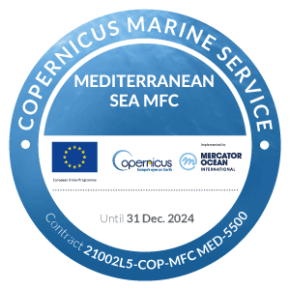Copernicus is the European Union’s Earth observation programme which offers information services that draw from satellite Earth Observation and in-situ (non-space) data and is managed by the European Commission. The Copernicus Marine Service provides regular and systematic reference information on the physical and biogeochemical state, variability and dynamics of the ocean and marine ecosystems for the global ocean and the European regional seas. It has been implemented by Mercator Ocean International (MOI) since 2015. It enables marine policy implementation, supports Blue Growth and scientific innovation. Copernicus Marine Service is an open and free of charge service, compliant with EU regulations such as INSPIRE and the Delegated Regulation on Copernicus data and information policy.
General objectives
This contract is issued within the Copernicus Marine Service phase of 2021 to 2027, for the provision of ocean analysis and forecasting products to be integrated into the Copernicus Marine Service. In particular the service will provide real-time and delayed-time physical, wave and biogeochemical products for the Mediterranean Sea.
The MED MFC is composed of three main components: Med-PHY, for the physical products; Med-BGC for the biogeochemical products and Med-WAV for the wave products.
The MED MFC Leader is Giovanni Coppini and the Deputy Leader is Emanuela Clementi, both from CMCC.
CMCC role
CMCC Foundation is the representative Member of the Consortium and is also responsible for the MED-MFC service desk, for the Med-PHY Production Unit, its Back Up Unit and its Archiving Unit, and for the Med-WAV Back Up Unit.
Activities
Main activities of the whole Mediterranean Sea service are grouped into:
- Data production and operations for near real time and multi-year products
- Service Desk
- Product Quality
- Systems Evolution and implementation
- Cross cutting activities: ocean state report (OSR) and ocean monitoring indicators (OMI), biogeochemical data assimilation, working groups participation (coastal working group, technical working group, ensemble forecasting working group)
- Management and Reporting
Expected results
The Mediterranean Sea MFC provides:
- Analysis for the previous 2 years
- Forecast for the following 10 days
- Reanalysis initialized in 1987 for the physics, 1999 for the biogeochemistry and 1993 for the waves
- Reanalysis-Interim initialized with the last available Reanalysis and extended every month using NRT data
of ocean physical, biogeochemical and wave variables for the whole Mediterranean Sea.
In particular CMCC will contribute with the development and implementation of upgraded systems in order to provide improved quality of the Mediterranean Sea forecast and reanalysis physical variables. The core of the modeling system is based on a coupled hydrodynamical-wave (NEMO-WW3) modeling system including tides assimilating available observations in the basin (insitu temperature and salinity profiles, sea level anomaly altimeter data) by means of the 3D-VAR scheme developed at CMCC called OceanVar, with a resolution of about 4 km and 141 vertical levels.
The analysis and forecasting system will progressively evolve to account for: a) improved tidal representation; b) upgrade of the numerical models and coupler versions; c) improved wave-current coupling, d) improved river runoff representation by using NRT and forecast runoff data coupled to an Estuarine Box Model; e) inclusion of daily lateral open boundary conditions from the Unstructured Turkish Straits System developed at CMCC; f) the upgrades of CMCC OceanVar scheme to accommodate assimilation of new observations and new parameterizations.
Moreover the production of new reanalysis to address the climate monitoring and ocean variability description will be delivered starting from 1950 (or 1980).
Partners
- Istituto Nazionale di Oceanografia e di Geofisica Sperimentale – OGS, Italy
- Hellenic Centre for Marine Research – HCMR, Greece
- CINECA, Italy


